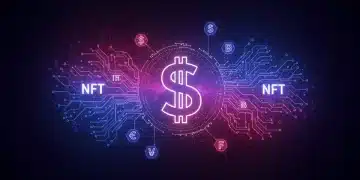Navigating the Web3 Legal Maze: A US Entrepreneur’s Guide

Navigating the legal landscape of Web3 in the US requires entrepreneurs to understand a complex framework of regulations, including securities laws, data privacy mandates, and intellectual property rights, to ensure compliance and foster sustainable growth.
The world of Web3 offers exciting opportunities for entrepreneurs, but it also comes with a complex web of legal considerations. This guide will help you understand how to navigate the legal landscape of Web3 in the US: A Guide for Entrepreneurs, ensuring your venture is compliant and set up for success.
Understanding the Regulatory Framework for Web3 in the US
The regulatory landscape for Web3 in the US is still evolving, making it crucial for entrepreneurs to stay informed and adaptable. Several existing laws and regulations may apply to Web3 businesses, depending on their specific activities.
Understanding these laws is the first step in ensuring compliance and mitigating legal risks.
Securities Laws and Token Offerings
One of the primary legal considerations for Web3 entrepreneurs involves securities laws, particularly when dealing with token offerings. The Securities and Exchange Commission (SEC) has taken the position that many digital assets, including tokens, may be considered securities.
This means that offering or selling tokens may require registration with the SEC or compliance with an applicable exemption. Failure to comply with securities laws can result in significant penalties.
Data Privacy Regulations
Web3 businesses often handle user data, which means they must comply with data privacy regulations such as the California Consumer Privacy Act (CCPA) and other state-level privacy laws. These laws grant consumers certain rights over their personal information, including the right to access, delete, and opt-out of the sale of their data.
Entrepreneurs must implement data privacy policies and practices that comply with these regulations. Ensuring compliance with data privacy laws protects user trust and avoids legal repercussions.
- Comply with CCPA and other data privacy laws: Implementing privacy policies, providing data access and deletion rights.
- Obtain informed consent for data collection: Being transparent about data usage and obtaining user consent.
- Implement data security measures: Protecting user data through encryption and other security protocols.
In conclusion, navigating the regulatory framework requires staying updated on evolving laws and seeking legal counsel when necessary. Understanding securities laws and data privacy regulations is critical for Web3 entrepreneurs in the US.

Intellectual Property Rights in Web3
Intellectual property (IP) rights are essential for protecting innovative ideas and creations in the Web3 space. Entrepreneurs need to understand how to secure and enforce their IP rights, as well as how to avoid infringing on the IP rights of others.
Protecting IP can provide a competitive edge and attract investment.
Copyright Protection for Web3 Content
Copyright law protects original works of authorship, including software code, digital art, and written content. Web3 entrepreneurs should ensure they have the necessary rights to use and distribute their content. This may involve obtaining licenses from copyright holders or creating original works.
Copyright infringement can lead to legal action, so it’s crucial to respect the IP rights of others.
Trademark Protection for Brands
Trademarks protect brand names, logos, and other symbols used to identify goods or services. Web3 businesses should consider registering trademarks to protect their brand identity and prevent others from using similar marks. A registered trademark can be a valuable asset.
Entrepreneurs should conduct trademark searches to ensure their chosen brand name is available.
- Conduct trademark searches: Ensure your chosen brand name is available and not already in use.
- Register trademarks: Protect your brand identity and prevent others from using similar marks.
- Use copyright notices: Clearly indicate ownership of original works and digital content.
In summary, protecting intellectual property is crucial for Web3 businesses. Understanding copyright and trademark law helps entrepreneurs secure their innovations and brands in the Web3 ecosystem.
Smart Contracts and Legal Agreements
Smart contracts are self-executing contracts written in code that automate the terms of an agreement. While they offer efficiency and transparency, they also raise legal questions about enforceability and liability.
Addressing these legal considerations is essential for using smart contracts effectively.
Enforceability of Smart Contracts
The enforceability of smart contracts depends on various factors, including the clarity of the contract terms, the intent of the parties, and the governing law. Courts may struggle to interpret and enforce smart contracts if the terms are ambiguous or conflicting.
Entrepreneurs should ensure that smart contracts are drafted with clear and unambiguous language to improve their enforceability.
Liability for Smart Contract Errors
Smart contracts are not immune to errors, and flawed code can lead to unintended consequences. Determining liability for errors in smart contracts can be complex, as it may involve questions of negligence, breach of contract, or fraud.
Entrepreneurs should implement rigorous testing and auditing procedures to minimize the risk of errors in smart contracts.
- Draft clear and unambiguous terms: Ensure the smart contract terms are easy to understand.
- Implement testing and auditing procedures: Minimize the risk of errors in smart contracts through thorough testing.
- Include dispute resolution mechanisms: Establish clear processes for resolving disputes related to smart contracts.
In conclusion, while smart contracts offer many benefits, their legal implications must be carefully considered. Addressing enforceability and liability concerns is crucial for using smart contracts safely and effectively in Web3 businesses.

Decentralized Autonomous Organizations (DAOs) and Legal Structures
Decentralized Autonomous Organizations (DAOs) are community-led entities governed by rules encoded in smart contracts. DAOs present unique legal challenges, particularly in terms of liability and legal recognition.
Choosing the right legal structure for a DAO is crucial for managing these challenges.
Liability Issues for DAO Participants
Determining liability for the actions of a DAO can be complex, as it may not be clear who is responsible for the DAO’s decisions. DAO participants could potentially be held liable for the DAO’s actions, depending on the legal structure and governing law.
Entrepreneurs should seek legal advice to understand the potential liability implications of participating in a DAO.
Choosing the Right Legal Structure for a DAO
Several legal structures may be available for DAOs, including limited liability companies (LLCs), cooperative associations, and unincorporated associations. The choice of legal structure will depend on the DAO’s specific activities and goals.
Each legal structure has different implications for liability, taxation, and governance.
- Seek legal advice: Understand the legal implications of participating in a DAO.
- Choose the right legal structure: Select a legal structure that aligns with the DAO’s goals.
- Implement clear governance mechanisms: Establish clear rules and procedures for DAO governance.
In summary, DAOs offer innovative ways to organize and govern communities, but they also raise significant legal challenges. Understanding liability issues and choosing the right legal structure are critical for the success and compliance of DAOs.
Money Transmitter Laws and Cryptocurrency Regulations
Cryptocurrency transactions are subject to money transmitter laws and regulations, which aim to prevent money laundering and other illicit activities. Web3 businesses that handle cryptocurrency transactions must comply with these regulations.
Compliance with money transmitter laws is essential for avoiding legal penalties and maintaining regulatory approval.
Compliance with Anti-Money Laundering (AML) Regulations
Anti-Money Laundering (AML) regulations require businesses to implement policies and procedures to detect and prevent money laundering. This includes conducting customer due diligence, monitoring transactions for suspicious activity, and reporting suspicious transactions to regulatory authorities.
Web3 businesses that handle cryptocurrency transactions must comply with AML regulations.
State and Federal Licensing Requirements
Many states require businesses that transmit money to obtain a license. The requirements for obtaining a money transmitter license vary by state, but typically include demonstrating financial stability, implementing compliance programs, and undergoing background checks.
Entrepreneurs should research the licensing requirements in each state where they operate.
- Implement AML compliance programs: Develop and enforce policies to prevent money laundering.
- Obtain necessary licenses: Comply with state and federal licensing requirements.
- Conduct customer due diligence: Verify the identity of customers and monitor transactions.
In conclusion, compliance with money transmitter laws and cryptocurrency regulations is critical for Web3 businesses. Implementing AML compliance programs and obtaining necessary licenses are essential steps for avoiding legal penalties and maintaining regulatory approval.
Data Security and Cybersecurity Considerations
Data security and cybersecurity are paramount in the Web3 space, where sensitive information and digital assets are at risk of cyberattacks. Entrepreneurs must implement robust security measures to protect their systems and user data.
Strong cybersecurity practices build trust and prevent costly data breaches.
Implementing Security Measures
Several security measures can help protect Web3 businesses from cyberattacks. These include using encryption to protect data, implementing firewalls to prevent unauthorized access, and conducting regular security audits to identify vulnerabilities.
Entrepreneurs should also train employees on cybersecurity best practices.
Responding to Data Breaches
Despite best efforts, data breaches can still occur. Entrepreneurs need to have a plan in place for responding to data breaches, including notifying affected parties, investigating the breach, and implementing measures to prevent future breaches.
Having a data breach response plan can help minimize the damage and legal risks.
- Implement encryption: Protect sensitive data with strong encryption protocols.
- Conduct regular security audits: Identify and address vulnerabilities in systems.
- Develop a data breach response plan: Prepare for responding to security incidents.
In summary, data security and cybersecurity are essential for Web3 businesses. Implementing security measures and preparing for data breaches helps protect assets and maintain user trust in the Web3 ecosystem.
| Key Aspect | Brief Description |
|---|---|
| 🔐 Data Privacy | Compliance with CCPA and other privacy laws is critical for user trust. |
| 🛡️ IP Protection | Safeguarding innovations through copyright and trademark laws is essential. |
| 📜 Smart Contracts | Ensure clear terms and rigorous testing to address enforceability and liability. |
| ⚖️ DAO Structures | Select the right legal structure to manage liability and governance for DAOs. |
Frequently Asked Questions (FAQ)
▼
Key considerations include compliance with securities laws, data privacy regulations like CCPA, intellectual property rights, money transmitter laws, and considerations for smart contracts and DAOs.
▼
You can protect your IP by registering trademarks for your brand, using copyright notices for original content, and securing licenses for third-party content you use.
▼
DAO participants may face liabilities depending on the DAO’s legal structure and governance. It’s crucial to seek legal advice to understand your potential risks.
▼
Comply with AML regulations, obtain necessary licenses for states where you operate, and conduct thorough customer due diligence to verify the identity of your users.
▼
Implement encryption, conduct regular security audits, train employees on cybersecurity best practices, and develop a data breach response plan to handle potential incidents effectively.
Conclusion
Navigating the legal landscape of Web3 in the US requires entrepreneurs to stay informed, seek legal advice, and implement comprehensive compliance programs. By understanding and addressing these legal considerations, Web3 businesses can mitigate risks and build a sustainable future in this innovative space.





